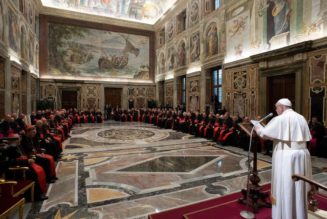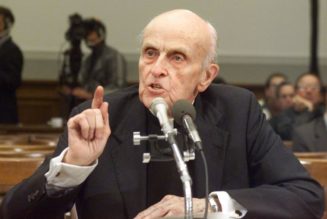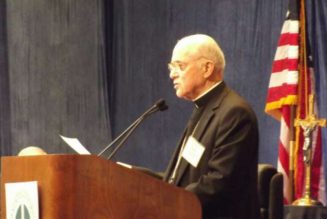Ever since I can remember, even as a very young child, I have struggled with saying a certain class of prayers. While some prayers—those exalting God’s goodness, or seeking His mercy—always felt as if I could easily make the words my own, this other class of prayer left me feeling self-conscious and doubtful of my own sincerity. For lack of a better term, I will call this class: prayers by the saints, for the saints.
With Lent upon us, I found myself once again pondering the words I was speaking to Our Blessed Lord in the Stations of the Cross; words penned from a saint. The traditional Stations of the Cross were written by St. Alphonsus Liguori, one of the most brilliant and holy men to have ever walked through this vale of tears. When we accompany Our Lord on His journey to Golgotha, St. Alphonsus is our guide along the via dolorosa, and it is his words that we are meant to echo.
And these words are hard to say.
In the fourth station we proclaim, “I love You, Jesus, my Love, above all things.” In the twelfth, “I love You with my whole heart.” In the fifth, perhaps the most shocking of all, “My beloved Jesus I will not refuse the cross as Simon did: I accept it and embrace it. I accept in particular the death that is destined for me with all the pains that may accompany it.”
Do I indeed? Do I really love Jesus with my whole heart? Do I truly not only accept the cross, but embrace it?
Once again, this Lent, I found myself saying these words while at the same time asking Our Lord, “How am I to say these things to you?”
I think, after many years, I finally begin to understand this kind of prayer.
In any act of speech, there may be at the same time both a truth conveyed and an effect brought about. For example, yelling “Fire!” not only conveys the truth that a fire is raging, but also produces the effect that people run to safety. There are other phrases that are more mysterious—phrases which at the same time both convey and bring about the very thing they convey. For example, when a mother gently rocks her crying child and whispers, “It’s ok. Everything is alright.” The words themselves express a truth to the child and at the same time help bring about that truth. Of course, the most profound example of this two-fold speech are the words, “I love you,” for these words, spoken truly, both convey the lover’s heart, while at the same time serve as an act of love. This is why lovers repeat the words to each other again and again. For, they feel that each expression is itself an act of love, and they may feel astonished to find that each utterance makes the proclamation that much truer.
“I love You with my whole heart.” This is why we must say these prayers, and repeat them often: so that each time we say them, they help to bring about the words themselves.
There is one other thing I had not considered before. It it this: God does not change. He knows all things, and all prayers I will ever speak to Him, past, present, and future, in an eternal now. I don’t simply mean all the prayers that I will speak to Him in my lifetime, but after this life is ended as well. For, if I am saved, as I hope to be, then my prayers in eternity are known by Him even now. Now, no one in heaven loves God with anything less than their whole heart. Since this is so, then we know that one day we will, indeed say to our Lord, “I love You, Jesus, my Love, above all things” and then we shall truly mean it, and know with absolute certainty that we truly mean it.
C.S. Lewis wrote once, “That is what mortals misunderstand. They say of some temporal suffering, “No future bliss can make up for it,” not knowing that Heaven, once attained, will work backwards and turn even that agony into a glory.”
Heaven works backwards. And it cannot be otherwise, for God never changes; he is not surprised. He sees us with Him in eternity, and he hears our prayer, spoken in eternity, that we love Him above all things—then He gives us the grace to bring this beatitude about.
Perhaps it is precisely when we doubt the sincerity of our prayers that we most need to repeat these prayers to Our Lord.
I think the saints understood this profoundly. I know St. Alphonsus understood it. For, in the twilight of his life, we are told that he was racked with doubts and impulses to despair of his salvation. This saint who wrote that he loved God above all things. I don’t doubt this was exactly the prayer he continued to say precisely to overcome his feelings of despair, until he finally awoke from his dark night into the peace and light of the Resurrection.
Our job, in this life, is to echo the words of St. Alphonsus, yes, but to listen for another echo, one that God hears even now: that of our own voice exclaiming, “I love You, Jesus, my Love, above all things.” For, each time we say these words, we bring these echoes closer together, until one day the echo has vanished and time and eternity will meet. Today then, listen for this echo, and with all confidence and hope in Divine Providence echo back, “I love You, Jesus, my Love, above all things.”
Join Our Telegram Group : Salvation & Prosperity









